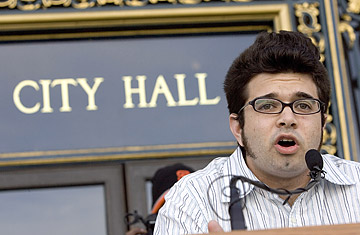
Josh Wolf speaks at city hall in San Francisco, California, April 3, 2007.
TIME: After spending nearly 8 months in federal prison, how does it feel to be free?
Wolf: Overwhelming. It's a great relief to be back in San Francisco. It's also a bit of a lightning storm of both friends and media contacting me as I return to what's home, but feels unfamiliar at this point. It's almost like the country boy going to Manhattan for the first time, and going from almost no stimulus to almost non-stop constant stimulus. It does take a certain toll [on] you.
Having settled with prosecutors, how do you feel?
I feel vindicated. A lot of people have voiced their objections and their concerns about the agreement. At the end of the day, the government really has no more than they did the day I was subpoenaed, so to that end I feel that this was a victory. I think it's a travesty that the law is such that journalists do not have the protections we need, and I think that my case reveals how powerful those needs are given the fact that there was nothing [incriminating] on the tape.
Why do you think the feds went after you?
To set an example to journalists and the public that the government has basically unlimited power to do what they want, and if you try to assert your human rights, your basic constitutional rights, which we should have under law, you will be punished unmercifully.
So you consider your imprisonment to be a politically motivated tactic to silence dissenters, especially bloggers, who now have an immediate and broad global distribution medium for their points of view?
I think it was an attempt to intimidate the press — both independent and mainstream — and those who engage in civil dissent.
Was it worth going to prison for your ideals?
Absolutely. It sets the ground for how necessary it is that we establish a federal shield law. I will be in Washington, D.C. in May trying to meet with legislators to push forth on a robust and comprehensive shield law that protects independent online journalists as well as the more established media.
What projects did you embark on in prison?
One of the first things I did while in prison is start an organization called Free The Media, which my Dad helped develop the website for. Basically, it's a web 2.0 interactive environment where people can collectively brainstorm and work towards developing campaigns to help assert the rights of the media against both governmental and corporate pressures and influences. [PrisonBlogs.net is another project where prisoners] will write to a central p.o. box to obtain a sponsor, then their sponsor will write to them and let them know, 'Here's my address, and you can send me letters or art [for posting].' This is will be an opportunity for the public to see firsthand what it's like in the prison system — both state as well as federal.
What prompted your release? You could have remained in federal detention until the grand jury's expiration in July.
The U.S. attorney finally agreed with the proposal that we had put forth back in November: [we would] publish and turn over the video in exchange for my release and not having to submit to testifying in front of the federal grand jury...As there was nothing of a sensitive or confidential nature on the videotape, it was worth fighting for the right that I should have to protect it. But once that right was lost [after all appeals were exhausted], once that battle was lost, there was really no purpose in perpetuating my incarceration simply on a matter of principle.
Initially, neither bloggers nor mainstream media rushed to your defense en masse. Eventually, however, you gained support. Why the reluctance at first?
I think what happened was both the independent and mainstream press saw me as someone who was calling out that this was an issue simply for attention, that basically nothing was going to come of this and this was just a publicity ploy of sorts. They didn't see it as being a serious issue or that I was under any threat. Once they realized that the alarm was real, and it had a consequence, and that I wasn't being a town crier for no reason, they realized that it was time that we all start discussing this issue and get it out there because it could affect them just as easily as it has affected me.
How does it feel to have become the story?
It's bizarre. It's very strange for a journalist to be the center of a story because it creates all sorts of weird situations, especially when they are in a position of writing op-ed pieces about it. It creates all sorts of conundrums in one's head.
How did you make use of all your time in prison?
I generally spent an hour a day working out. I read about 50 books. I received about 1,000 letters and wrote back to almost everyone. I did a lot of talking to the various prisoners that were at the institution, including Barry Bonds' former trainer Greg Anderson. I also did a fair amount of playing spades, dominos, and Scrabble — and eating, of course.
What did you miss most about life on the outside?
Fresh air. The air inside the prison is what you expect to find on a commercial jet: sticky, stuffy, and hard to breathe. It's constantly re-circulating. I seriously missed not being able to put on this CD or that CD and hear what I wanted to. And of course, the lack of any females in the environment was also not too great.
